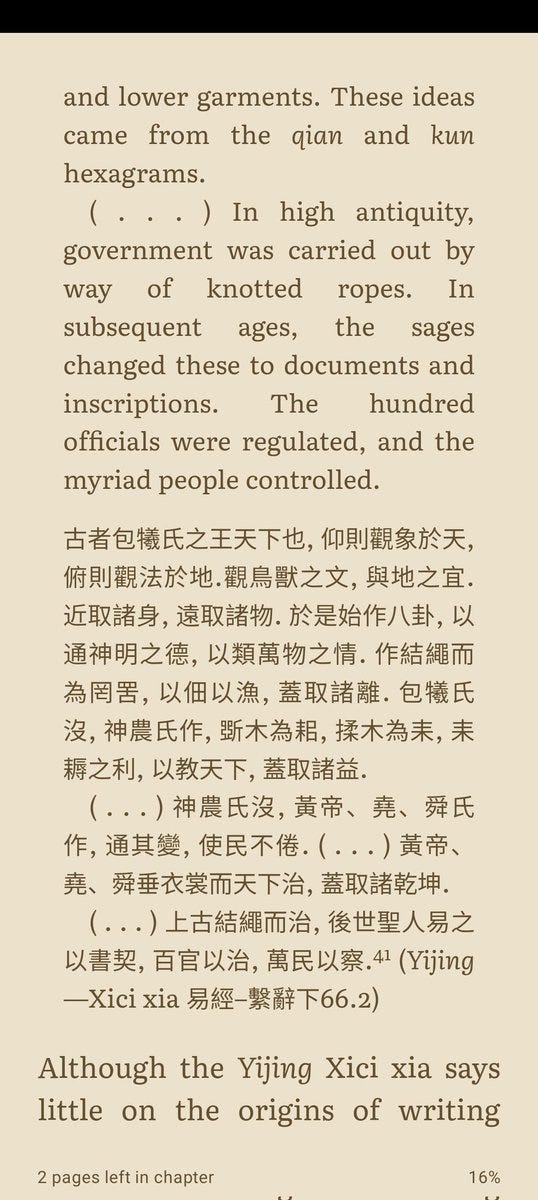ChatXiPT, Tweets of the Week, Three Body Problem, Trudeau Troubles, Palo Alto Meetup, Baidu vs Xiaohongshu in Search?
Is ChatXiPT Really That Scary?
I’ll be holding a meetup in Palo Alto Tuesday afternoon. Would love to see you there!
Is ChatXiPT Really That Scary?
Matthew Mittelsteadt is a technologist and research fellow for the AI and Progress Project at the Mercatus Center at George Mason University.
Last week, an op-ed in The Hill offered a grave AI warning: generative AI capabilities, the authors claim, represent a “historic breakthrough in brainwashing” for authoritarian nations given their capability to “create unique, compelling content at scale.” It would seem AI offers much to fear. The problem with this dramatic analysis is that these systems are not phenomena — they are products. Generative AI first and foremost must be usable and offer personal benefit. Once novelty wears off, what will keep people using these products will be relatively boring. Generative AI might be used to edit writing, craft novel recipes, or even design travel itineraries. But if these systems place propaganda ahead of these everyday functions, no one will use them.
The demands of practical utility act as an upper limit on how much political thought can go into generative AI. If a system suggests readings from the Little Red Book rather than what type of cheese to pair with wine, it will lose user trust. In more subtle cases, if users find a system is twisting the everyday facts they need to do their work, they will ignore it. On the development side, if companies are forced to focus engineering effort on creating systems that spread CCP thought, that will come at the expense of creating a system with the dynamism needed to do practical tasks.
An upper limit certainly doesn’t mean there is no propaganda risk. A theoretical “ChatXiPT” could be used to spread censored versions of history, hide certain news stories, or distort facts about the west. This is not a novel risk. To put these risks into context: the internet already does this. In fact, I’d argue the internet will remain more of a problem. Its rules-based form already allows for powerful censorship and mass disinformation. What’s more, the internet can wield powerful bandwagon effects that capture our socially driven psyches. Meanwhile, “ChatXiPT” would be subject to uncontrollable probabilistic responses and the unconvincing coldness of robotics.
At present, generative AI is far too glitchy to offer these “breakthrough” capabilities. Even if it does mature, I have strong doubts that authoritarian governments will be able to balance its usability with their propagandistic goals. The social and communication-based nature of the internet is already powerful enough to twist the information environment, and I don’t see a future where these new generative products meaningfully disrupt the current propaganda apparatus.
Tweets of the Week: Semis + AI Section



Nicholas—Xi Wobbling? Not So Fast
Christopher Johnson, formerly a CIA senior China analyst, recently published an article in Foreign Affairs. He argues that the mainstream narrative describing Xi Jinping’s wobbly start to a third term — given the messy end of the zero-covid strategy, the White Paper Protests, and a spy balloon’s intrusion — is a misreading.
Citing some of Xi’s prior gambles — an anti-corruption campaign, deleveraging reforms, and so on — Johnson writes, “A hallmark of Xi’s rule has been his propensity to make big bets that he thinks will pay off for him and for China”; those bets “keep his adversaries, both domestic and foreign, off balance.”
Johnson also hits on key differences between the US’s and PRC’s governmental structures — differences which help make sense of, for example, the apparent disconnect between the Ministry of Foreign Affairs and the military during the spy balloon incident. With that in mind, he extends a helping hand to, in his view, Biden administration top officials with “little awareness” of those distinctions:
Biden tells Xi he wants competition instead of conflict but then repeatedly says publicly that the United States will defend Taiwan militarily and quips in his State of the Union address that no foreign leader wants Xi’s job. His secretary of defense is mystified that his Chinese counterpart will not answer the phone, and Biden’s advisers wonder why China will not discuss security guardrails. The answer is that Xi does not want them.


Zhengyuan—Tencent’s Three-Body Problem, Eps. 1-5
Tencent’s recent release of the Three-Body Problem (on youtube with eng subs here) touches one of the most critical questions of our time — the question of the status of humanity. On February 24, Kissinger, Eric Schmidt, and Daniel Huttenlocher described in an article that “Generative Artificial Intelligence presents a philosophical and practical challenge on a scale not seen since the Enlightenment,” referring to the public release of ChatGPT to the world on November 30, 2022. The chatbot, while probably not yet sentient, certainly tries to pretend that it is, and is very easily triggered into exhibiting some of the worst human behaviors, including gaslighting and threatening people with violence. Before such a great new intelligence, so powerful and equally inhuman, what is to become our own world, the world of our ordinary human wants, dreams, relationships, and longings? What is to become of everything and everyone that we love?
The Three-Body Problem show is a magnificent re-rendering of Liu Cixin’s magnum opus, and brings to the forefront this existential problem of humanity. The main characters — all scientists and the brightest, most forward lights of humanity — confront the collapse of science itself, and with it, their entire existential understanding of the world. They confront a science with inconsistencies, which is being manipulated by an utterly greater power, and start to feel like turkeys in a slaughterhouse- driving some of them even to suicide. Before such a great power — which we later find out to be the Trisolarian alien civilization and whom the scientists simply refer to as “the Lord,” but which could just as easily be the AI that we are soon to live with — what is to remain of what we know and love about humanity? The show is incredible because it portrays this epic struggle — but this epic struggle is already within each one of us and in our civilization.
In one moving scene thirty-four minutes into episode 5, the main character, Wang Miao, is driven to the brink and is narrating the struggle and existential terror. We are brought back to humanity by the rustic cop sidekick Shi Qiang, who reminds us, “Well what could be at the end of all this? The destruction of the earth? The end of humanity? Or ‘the end of science as we know it?’ So what the hell if? So humanity returns to the agricultural age, or even the prehistoric age, cutting wood and making fire, planting fields and hunting game, so bloody what? If our ancestors could do this, why can’t we?” So what the hell if? These words — beyond any rationalizations, beyond any analytical determination — present the simple human drive to carry on, to fight on, to love on, through hell and high water, through destruction and the apocalypse. This determination — and the loyalty and courage the characters have for one another, the simple acts of love shown in the show — take us beyond the rational projections of doom and gloom. Could it be that what is human is not to be found solely in what is logical and rational? Could it be that we are human based on our ability to care for one another, to be courageous for one another, to be fully ourselves? The show reminds us that, before artificial intelligence, we were the first intelligence; before alien races, we were the first race; and that to be human is more potent, more intense, more incredible, and more moving than ever.
Irene—Xiaohongshu Taking Over Search?
Search on Baidu is terrible now, but Xiaohongshu, the Instagram-like platform beloved by young women, is emerging as an unlikely replacement. This piece from the Initium (in Traditional Chinese) explores how the platform has become an encyclopedia of how-to guides for Chinese people around the world:
These days, Guo Chen [a twenty-three-year-old working in the UK] feels that Xiaohongshu resembles “a logic of finding solutions.” “If I enter a question, it responds with a solution.” Some people around him say that Xiaohongshu is the new search engine. “When you’re abroad, you can use Google to find things. In China, however, Baidu Search’s algorithm and content are both awful now, so maybe people are abandoning traditional search engines altogether.”
When does he use Google? For Guo Chen, it’s when he wants to confirm a piece of information he got from Xiaohongshu, or when he wants to find out “what’s this”; “I really want the top result to be Wikipedia every time.”
Nan, a post-2000s student studying in South Korea, admits that she now uses Xiaohongshu as Baidu. “Lots of other people post questions, so sometimes when I search on there I find that other people have the same questions as I do, and the comment sections are just like Baidu Knows.” In addition to finding recommendations for restaurants, bars, and entertainment, she also uses it to search up Korean grammar and find example sentences.


Irene—Trudeau’s China Troubles Continue
Meanwhile, things up north continue to spin out of Justin Trudeau’s hands. Major opposition parties both left and right are continuing to call for a public inquiry into alleged Chinese interference in federal elections after Trudeau ruled it out, and now high-profile former Trudeau advisors Gerald Butts and Richard Fadden have joined the chorus. This Globe and Mail piece provides a succinct summary of recent events:
Gerald Butts, who was Mr. Trudeau’s principal secretary until he resigned during the SNC-Lavalin affair in 2019, said Sunday that he too thinks a non-partisan inquiry is necessary, to look at the broad spectrum of foreign interference and not just China’s activities.
“The radical changes in geopolitics and technological advancements of the past several years mean we’re in a different, more dangerous world where many foreign actors have an interest in harming democratic institutions and the capacity to do it,” he told The Globe. “We should be confident in our democratic institutions, but we should guard them aggressively.”
Next up, Jordan’s pick for the best Sichuan in midtown Manhattan, a gorgeous Japanese print from 1960 of two cats staring at a butterfly, and more tweets!





